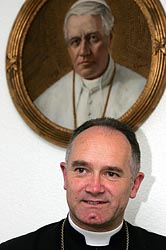On the 8th was the commemoration of the 40th anniversary of the founding of the Synod of Bishops. Various bishops spoke. It was noted that both John Paul II and Benedict XVI had served as relator general. The Holy Father will no doubt live a long while, but does his position now give Scola the added leg up in the eventual conclave? We shall see.
Clemens August Cardinal von Galen was beatified (minus direct Papal participation).
In a letter to the Pontifical Lateran University, Benedict XVI commenorated the centennial anniversary of the birth of Hans Urs von Balthasar.
Pursuing the plan
The Synod continued today with its deliberations. From today's VIS email:
ELEVENTH GENERAL CONGREGATION
VATICAN CITY, OCT 10, 2005 (VIS) - This morning, in the presence of the Holy Father and of 244 Synod Fathers, the Eleventh General Congregation of the Eleventh Ordinary General Assembly of the Synod of Bishops was held. The president delegate on duty was Cardinal Francis Arinze.
Following are excerpts from some of the speeches delivered this morning:
CARDINAL LUBOMYR HUSAR M.S.U., ARCHBISHOP OF LVIV OF THE UKRAINIANS, UKRAINE. "My premise is that there can be no doubt whatsoever that the Eucharist is the source and summit of the life and the mission of the Church. But this is also true for Oriental Churches! (Therefore) if the Liturgy is a 'regula fidei' ('lex orandi, lex credendi'); if the divine liturgy celebrated by Oriental Churches in communion with the See of Rome, and by Orthodox or Apostolic Churches, is identical; if there is mutual recognition of the apostolic succession of bishops and, consequently, of priests that celebrate the Eucharist, then my question is: what more is required for unity? Is there perhaps another 'fons' or another 'culmen' superior to the Eucharist? And if not, why isn't con-celebration permitted?"
As you'll all remember (since I can't find the link), Husar suggested a couple of weeks ago that there should be one Church in Ukraine under one patriarch, in communion with Rome. Are his words here a further step in floating the idea?

--133x198.jpg)


